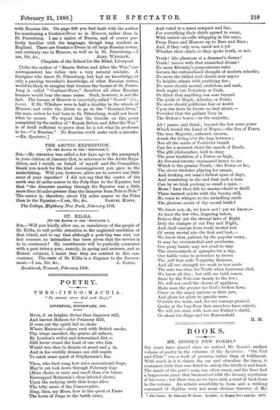POETRY.
THEO-JINGO-MACHIA.
"Ye cannot serve God and Jingo."
LIVERPOOL, SOUTHWARK, 1880.
MusD, if on heights divine thou lingerest still, And leavest Helicon for Primrose Hill, If even yet thy spirit fail to choke Where Mammon's altars reek with British smoke, 'Thy wings unsoiled, thy genius all unhurt, By London's wilful and determined dirt,— hover round the head of one who fain 'Would woo thee in despite of greed and g in, And in his worldly dreams can still aspire To catch some spark of Polyhymnia's fire.
'Thou, who hart sung how mice encountered frogs, May'st yet look down through February fogs (More choice in taste and smell than e'er before Enwrapped Britannia's shop-infested shore), Upon the undying strife that keeps alive The lofty name of the Conservative.
Sing, then, my Muse, how in the quest of Fame The hosts of Jingo to the battle came, And voted in a mass compact and fair, For everything their chiefs agreed to swear, With varied cat-calls whipping in the mass, From Peace and Honour up to Beer and Bass ; And, if they only won, cared not a jot 'Whether their chiefs or they spoke truth, or not.
Truth ! idle phantom of a dreamer's theme !
Truth! rococo with that evanished dream !
No more Eternity's preposterous rules Govern the enfranchised thought of modern schools ; No more the fabled soul should now aspire To heights aflame with purifying fire ; No more should mortal, credulous and rash, Seek aught but Notoriety or Cash, Or think that anything can soar beyond The pride of Maple, Allenby, or Pond; No more should politician fear or doubt
Upon the facts he knows no fact about,—
Provided that the gallant Tory be The Briton's boast,—in the majority.
Ah ! pause, and think; beyond the few score years Which bound the Land of Hopes,—the Sea of Fears, The true Majority, unheard, unseen, Await the living o'er the leap between ; Nor all the mists of Positivist breath Can for a moment cloud the march of Death.
The glib philosopher, bold to deny The poor tradition of a Power on high, At five-and-twenty summoned hence to see Which is the greater Trath,—the Power or he ; The clever trickster playing for amaze, And tricking out man's fullest span of days, And wondering in the end that such a man Can by no trick prolong so small a span,— Muae ! hast thou left no master-chord to thrill These bastard spirits with thy beauty still, No voice to whisper to the dwindling earth
The glorious secret of thy sacred birth P We know not, oh, we know not ! yet we know,—
At least the few who, lingering below, Believe that yet the eternal laws of Right Defy the changes of our Day and Night, And shall emerge from every mortal test
Of every mortal aim the first and best,—
We know that, patient, by the popular scorn, It may be, overmatched and overborne, Our puny hands may not avail to stay The circus-march of spangles for a day, Our feeble voice be powerless to drown The yell that calls Vulgarity Renown, And all our strength too weak to tear aside The nets too close for Truth when Lawrence died.
We know all this ; but still our faith renew, Steer by the Pole-star steady to the few; We will not swell the chorus of applause, Make man the greater for God's broken laws, Cheer on the angry nations in their jars, And glean for glory in ignoble wars, O'erride the weak, and, for our courage praised, Quake at the bug-Bear that ourselves have raised; We will not stain with dust our Father's shield, Or shout for Jingo and for Beaconsfield.
IL M.


































 Previous page
Previous page